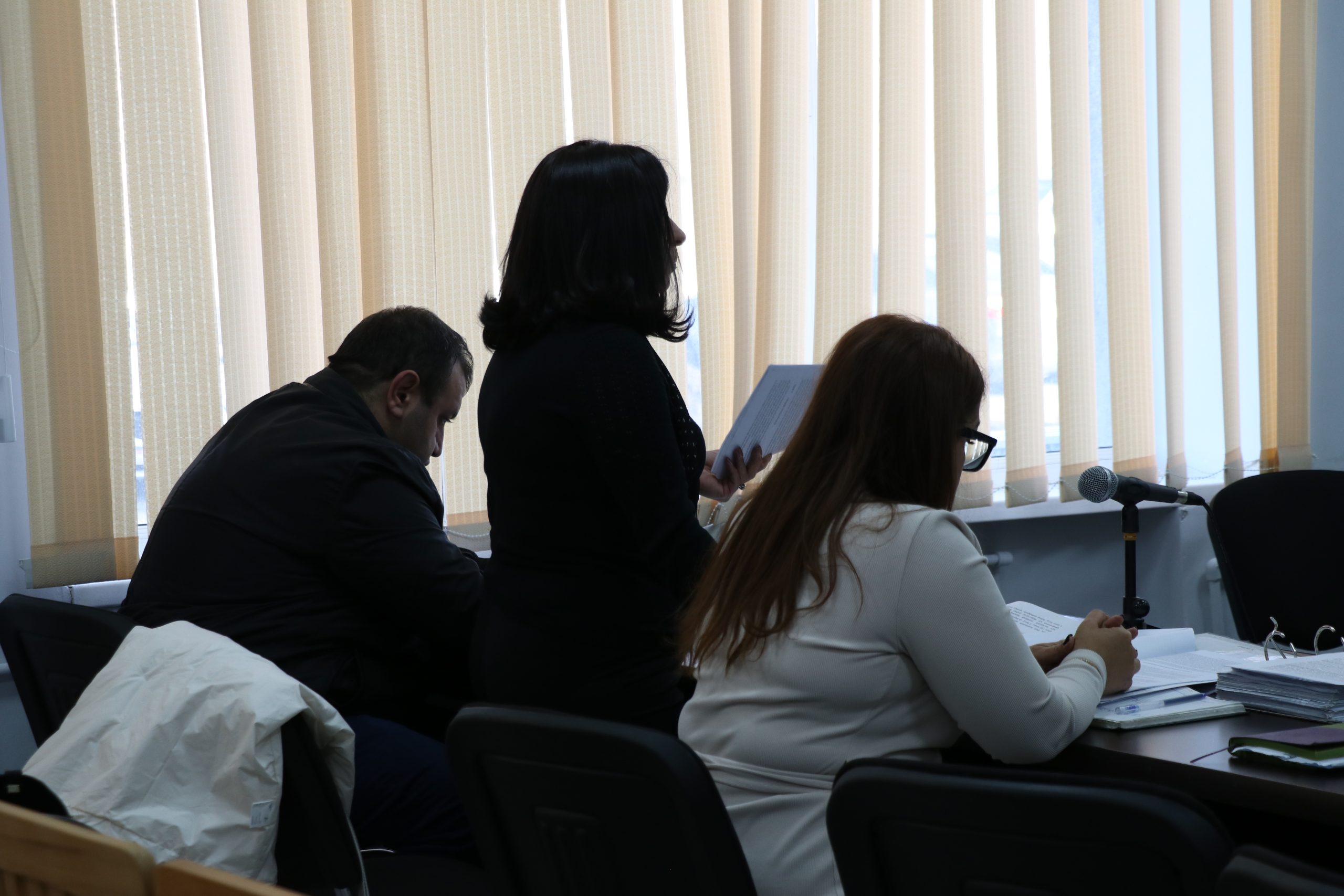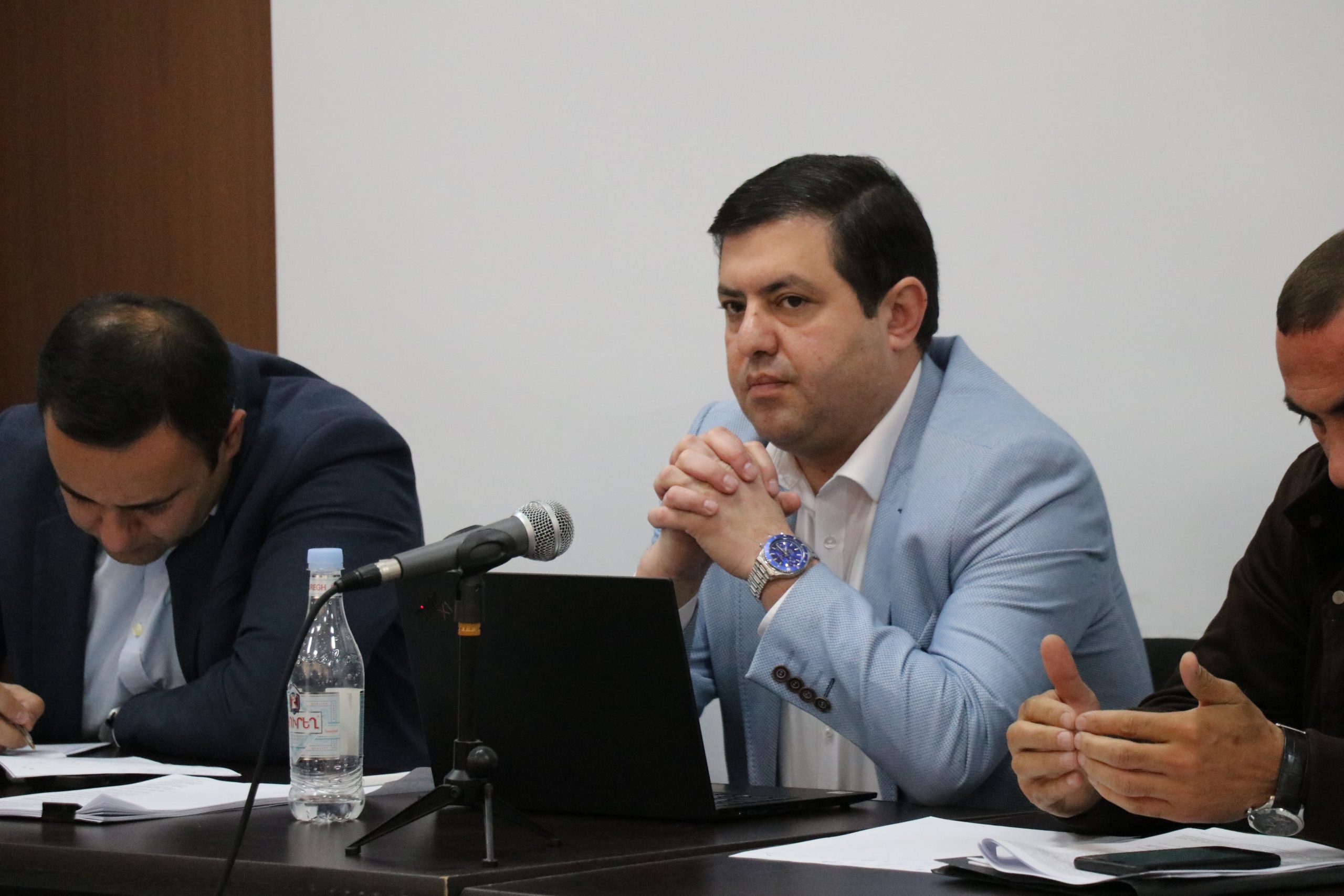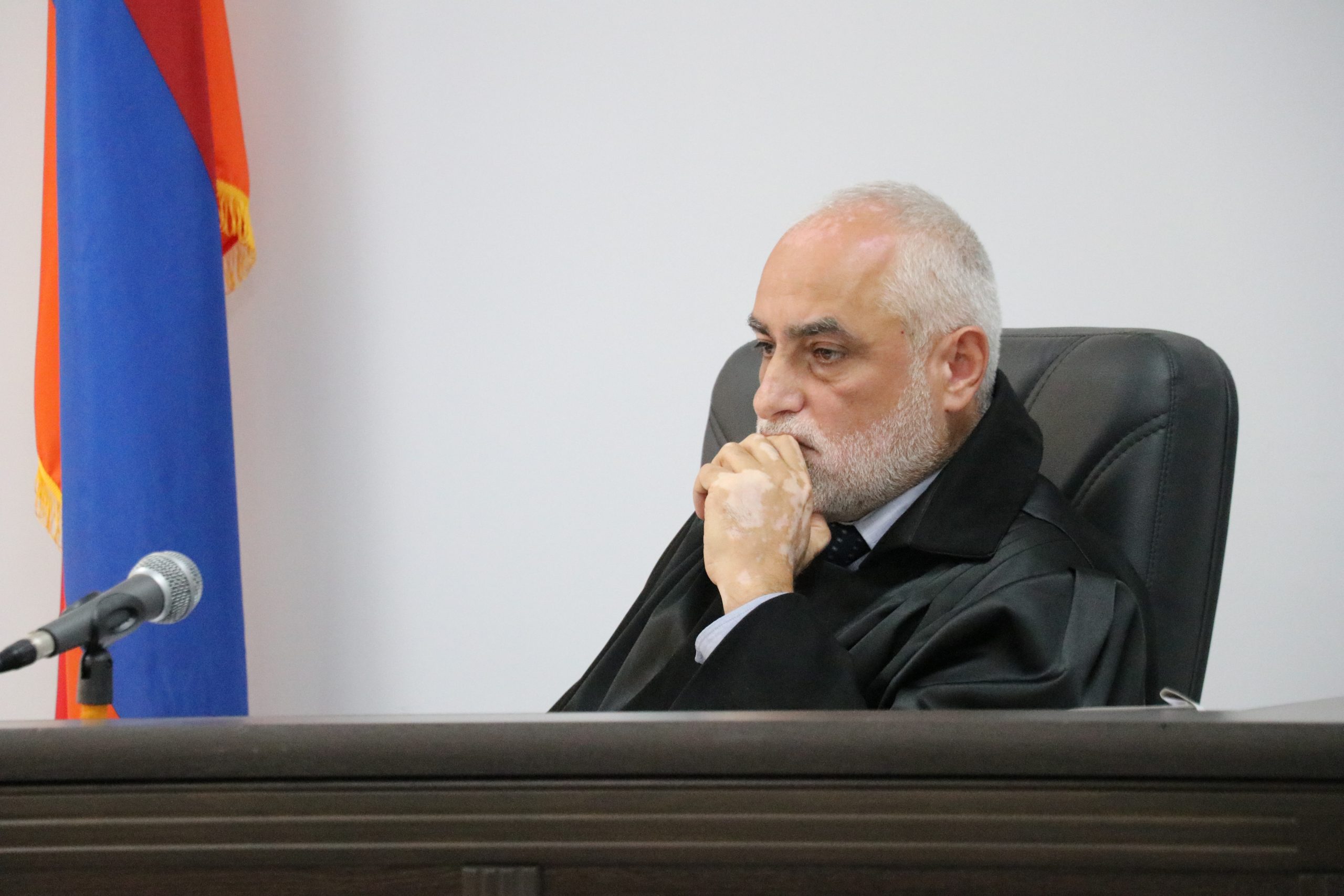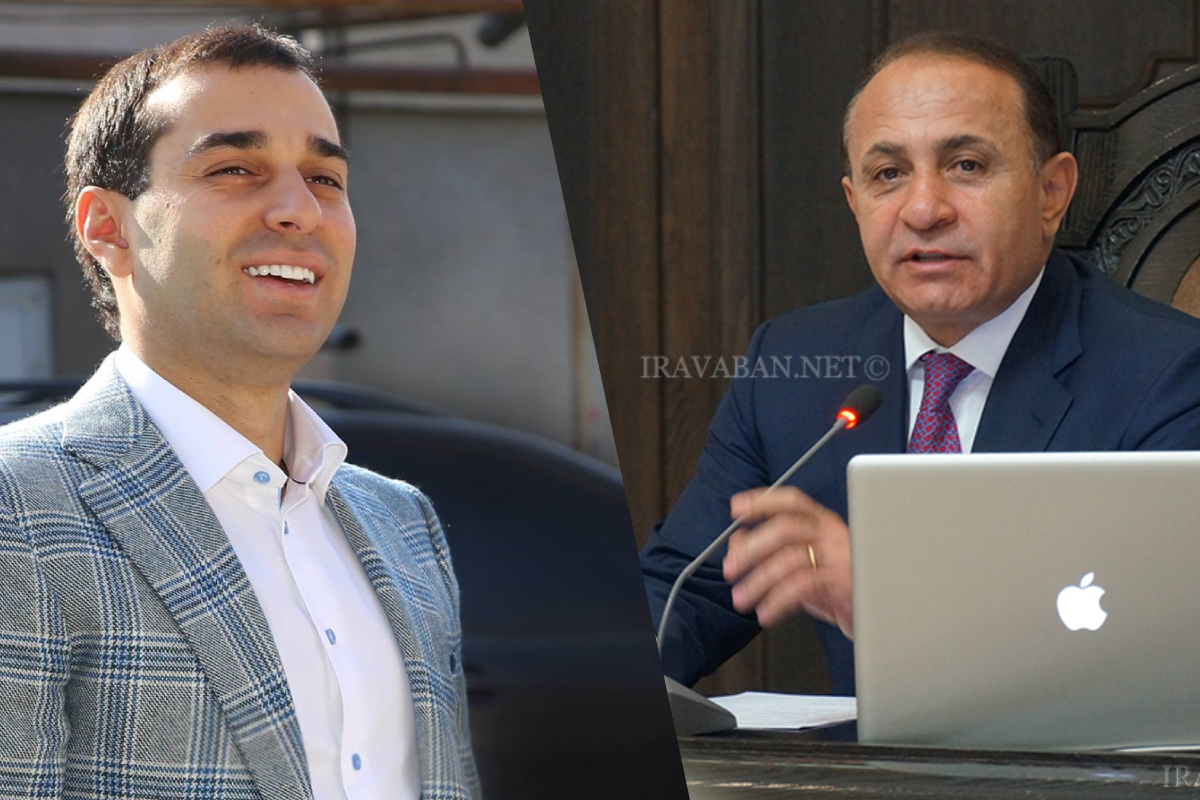On 17 November, the Anti-Corruption Court continued the examination of the lawsuit filed by the Department for Confiscation of Property of Illicit Origin of the General Prosecutor’s Office against the 13th Prime Minister of RA Hovik Abrahamyan and his related persons, with the demand for the confiscation of property of alleged illicit origin. The session is chaired by Judge Karapet Badalyan.
According to Iravaban.net, at the beginning of the session, Hovik Abrahamyan’s representative Varazdat Asatryan submitted a motion to self-recusal to the judge,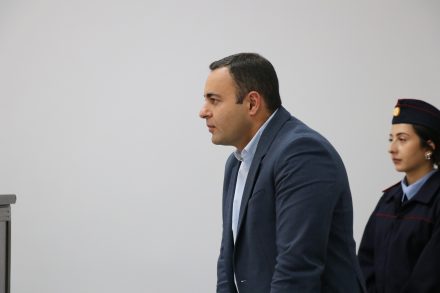 stating that the latter is biased. According to the lawyer, he had informed the court on 29 September that he will be on vacation from 22 to 29 October. He expected that no court session would be be called on those days, but a court session was called on 26 October. “Different behavior was demonstrated within other cases. I believe that the court showed its biased attitude towards the representative of the trial participant in such a way, as a result of which the principle of equality of the parties was violated.”
stating that the latter is biased. According to the lawyer, he had informed the court on 29 September that he will be on vacation from 22 to 29 October. He expected that no court session would be be called on those days, but a court session was called on 26 October. “Different behavior was demonstrated within other cases. I believe that the court showed its biased attitude towards the representative of the trial participant in such a way, as a result of which the principle of equality of the parties was violated.”
However, presiding Judge Karapet Badalyan stated that judicial acts cannot be a basis for challenge, including the acts on setting the session day. “Your petition is not subject to consideration.”
The judge also clarified for the lawyer that the issue was discussed several times in the previous court sessions. Hovik Abrahamyan has 4 representatives. “You asked not to investigate in your absence, Mr. Abrahamyan terminated the powers of 2 more lawyers, but the powers of the 4th representative were not terminated. Taking all that into account, the court continued the investigation of the case. This is for your information.”
Varazdat Asatryan tried to counter saying that it should have been clear to the court that he was the “main” representative. Karapet Badalyan insisted: there is a power of attorney based on which 4 lawyers acted. “Organizing your work is your task and not of the court.”
The lawyer claimed that the identity of the other 3 lawyers was not verified in court, they were not involved in the case.
Then Davit Gasparyan, the representative of Hovik Abrahamyan’s son, Argam Abrahamyan, submitted a petition to apply an accelerated trial. The Prosecutor’s Office considered some of the properties subject to confiscation to be legal in its statement of claim. In some cases, a part of 1 unit of property was considered legal and the other part was of illicit origin. According to Gasparyan, in the mentioned case, the plaintiff submitted a demand to confiscate the entire property. “With this petition, we present the position that the claim is baseless on the grounds that there are no legal and factual grounds for confiscation of parts of the mentioned properties. Submission of this petition does not mean acceptance of the position of the Prosecutor’s Office or the claim for the rest of the claim. Please use an accelerated trial and reject the claim completely.”
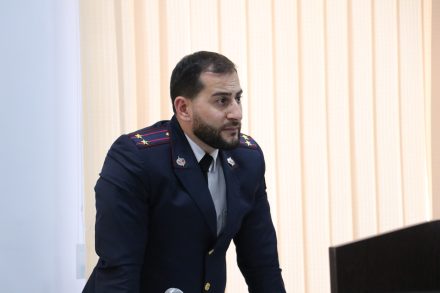 Tigran Yenokyan, Deputy Head of the Department for Confiscation of Property of Illicit Origin, announced that the norms defined by the Civil Procedure Code on the application of accelerated trial cannot be applied to confiscation proceedings of illegally sourced property.
Tigran Yenokyan, Deputy Head of the Department for Confiscation of Property of Illicit Origin, announced that the norms defined by the Civil Procedure Code on the application of accelerated trial cannot be applied to confiscation proceedings of illegally sourced property.
“In addition, after the decision on the allocation of the burden of proof, the defendant may submit such data that will have a significant impact on determining the part of the property subject to confiscation that is not justified by the legitimate income of the person. In other words, a situation is possible when the evidence presented by the defendant is accepted by the court and the cited facts are confirmed, the amount of legal means available to the person to acquire the said property will be changed,” the prosecutor noted, adding that the plaintiff is not bound to refuse the claim to some extent if there are grounds.
Smbat Minasyan, one of the lawyers involved in the case, noted that the petition is valid and subject to satisfaction. The lawyer was not satisfied with Tigran Yenokyan’s answer that the entire property is being seized, because the legality of a part of it may be disputed during the trial.
“With that logic, let’s seize the property of the lawyers, too.” It can be justified during the examination that the property of their clients is not enough…” here the judge interrupted Smbat Minasyan. He mentioned that Minasyan’s statement about seizing the lawyers’ property contains irony and mockery regarding the position of the plaintiff. “The court evaluates it that way. Please refrain from such expressions. Be very careful with examples. Such expressions are unacceptable.”
The lawyer mentioned that only one property of his client has not been seized, and if he proposes to seize it too, will it also be considered as “sarcasm”? “It turns out that I do not have the right to speak in court, to express my opinion?” I believe that the plaintiff mentioned circumstances that are beyond the subject of the claim, the basis of the claim.”
The representatives of the defendants involved in the case joined the petition presented by Davit Gasparyan regarding the application of accelerated trial.
However, Judge Karapet Badalyan found that this is not a case that can and should be examined in an accelerated trial, considering its complexity, the number of participants and the amount of submitted documents. “The court decides to reject the petition.”
Further, Hovik Abrahamyan’s representative Varazdat Asatryan, presented his motion to appeal to the High Court regarding the constitutionality of a number of articles of the Law “On Confiscation of Property of Illegal Origin”. The change made in 2022 in the Law “On Confiscation of Property of Illegal Origin” is problematic for the lawyer, by which “retroactive effect was given” to the norm on setting the maximum period of study to 3 years instead of 2. The mentioned law also referred to the dates of the study started regarding Hovik Abrahamyan. The lawyer also believes that the changes made in the law worsened the legal situation of his client.
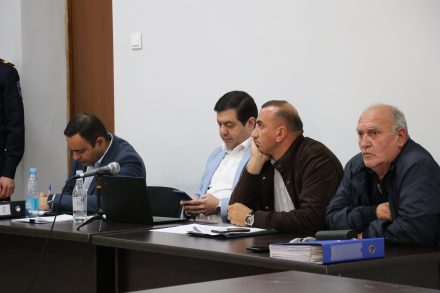 It is noteworthy that such petitions on the same basis have been submitted more than once, both in other proceedings for confiscation of property of illicit origin, and by Varazdat Asatryan himself, within the framework of other proceedings. The lawyer submitted a petition with the same content in the case of former Prosecutor General Gevorg Kostanyan, which was addressed to judge Lili Drmeyan. It was rejected. A petition with the same content was presented in the case of former NA deputy Mher Sedrakyan, which was also addressed to Karapet Badalyan. This time, the petition was presented by a different lawyer, Varazdat Badalyan. It was also rejected by the judge.
It is noteworthy that such petitions on the same basis have been submitted more than once, both in other proceedings for confiscation of property of illicit origin, and by Varazdat Asatryan himself, within the framework of other proceedings. The lawyer submitted a petition with the same content in the case of former Prosecutor General Gevorg Kostanyan, which was addressed to judge Lili Drmeyan. It was rejected. A petition with the same content was presented in the case of former NA deputy Mher Sedrakyan, which was also addressed to Karapet Badalyan. This time, the petition was presented by a different lawyer, Varazdat Badalyan. It was also rejected by the judge.
Taking into account the above, the claim of prosecutor Tigran Yenokyan that the motion was submitted to unreasonably delay the sessions does not seem exaggerated. The fact is that today from 15:00 to 18:00 only these 3 motions were discussed in the session hall, no other procedural actions were taken.
However, Varazdat Asatryan insisted in court that the defendant has no tendency to delay the investigation of the case. “The judicial process, according to my logic, was delayed in the conditions when the study lasted more than 2 years, or after the filing of the lawsuit, there was a change in the basis of the lawsuit, a third party was involved. But we have never allowed ourselves to be described as delaying the judicial process.
In his opinion, this is the stage of the trial where such petitions should be exhausted. “This stage is meant for that, so when should we do it?”
In any case, Judge Karapet Badalyan rejected the motion to apply to the CC and suspend the case proceedings.
The court had no reasonable doubts about the cited norms. “The court itself can come to a conclusion on the question of whether part or all of a particular law contradicts the Constitution.”
It should be noted that the High Court has repeatedly recorded in its decisions that the authority to reveal the legal content of a law and other normative legal act, and to ensure uniform application of any provision of the latter, is reserved to the three-level judicial system by the Constitution and the law. This is also documented by the procedural decisions of the CC, by which the examination of various applications submitted by the courts was rejected.
Due to the end of working hours, the preliminary court hearing was postponed.
Yevgenya Hambardzumyan
